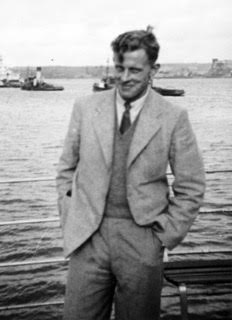Pacifist thoughts from an army chaplain during World War I
‘It is usually very difficult to find much to say which will not offend the vigilant eye of the censor,’ wrote Kenneth John Best to his family in May 1915, while serving as an army chaplain during World War I. Even so, he managed to say much about the horrors of war.
In December 1914, while still safe in Egypt and yet to be posted to the front he had expressed his frustration with humanity in a letter to his father. ‘The question always occurs to me, why do men try to reach justice by the sword?’ he asked. ‘Brute force seems to have no connection that I can see with Justice. In this particular case, it may turn out all right – but I hope there will after this be some better means found for settling disputes.’
Later, from the bloodbath of Gallipoli, he wrote: ‘What a mad world this is! I suppose we shall soon come to our senses and settle the matter which might just as well have been settled without the carnage. How much wiser were the Israelites and Philistines when they settled their dispute by single combat of David and Goliath.’
Paradoxically, even though he was a non-combatant, he shared a kind of fascination with the violence while revolting against it: ‘I am able to spend most of my time with the boys in the trenches,’ he told his family on 28 June 1915. ‘The only time I cannot go with them is when they charge. I should love to go with them then, but I could be of no use so I wait ‘til they have got into their new position and then join them as soon as it is possible. It is then that one sees the real horrors of war. The trenches are full of dead and dying Turks, Germans and our own boys. Their moans and cries for help are simply heartbreaking. I hope to goodness we shall soon be relieved for the sake of these poor lads. They are played out. The ghastly sights and foul smells on top of incessant work day and night have overtaxed their endurance.’
Invalided out the following month, he wrote from the General Hospital in Alexandria of his regret at being away from the action, missing the concert of battle: ‘I began to loathe the peace and quiet. I listen for the roar of naval gun. The shell from the howitzer singing overhead. The mighty crackle of the rifles and machine guns. Distinguishing the slow dull rattle of Turks from quick metallic rattle of our own, and deducing the proportion of Turk rifle shots to our own by the stray whistling over our heads and so concluding what is happening. It is all very fascinating and now it is gone. I long to be in the thick of it again.’
He admits to the strange delight of battle, but is under no illusion about the appalling casualty rate. ‘As I see these soldiers climbing over the parapet for a charge, I know that just only about 400 out of 1,000 will come back untouched. The life is glorious for its excitement but its ghastliness outweighs it.’
Convalescing in Cyprus in August 1915, he concludes on a gloomy but philosophical note: ‘Wars will never cease so long as selfishness is one of the strongest powers in the world. Only self-sacrifice in everyday life will make wars cease.’
Kenneth Best continued his war service in France and was awarded the Military Cross on 1 January, 1918. He retired to Budleigh Salterton, where he died aged 93, on 19 April, 1981.
The image of his headstone in St Peter’s Burial Ground in Budleigh is shown alongside a photo of Kenneth Best with his parents, the Rev and Mrs J.D. Best on the day of his award at Buckingham Palace. Copyright Imperial War Museum




Comments
Post a Comment